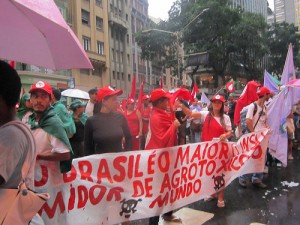By Mario Osava
RIO DE JANEIRO, Jun 20 (TerraViva) Members of unions and the Landless Movement (MST) dominated the parade of nations, covering with red the Avenida Rio Branco, in the center of Rio de Janeiro, with at least 50,000 people protesting against the green economy.
The Central Workers Union (CUT) brought about 8,000 protesters, according to its national secretary of communications Rosani Bertoti, a family farmer from Xanxerê, in the west of Santa Catarina. “80 buses came only from the state of Rio de Janeiro,” he said.
Green economy is just a facade, “it solves nothing” in respect to what matters to workers: decent employment, collective bargaining rights, autonomous organization, equal wages for men and women and the end the slave labor, she declared, minimizing critics from activists who accuse the CUT of joining forces with the government.
 The General Workers Union (UGT) and the Central of Workers of Brazil (CTB) also mobilized many affiliates, but the largest group was without doubt the rural workers of MST, with thousands of flags and red caps.
The General Workers Union (UGT) and the Central of Workers of Brazil (CTB) also mobilized many affiliates, but the largest group was without doubt the rural workers of MST, with thousands of flags and red caps.
A new cycle of robbery is what the green economy announces and the perpetrators of environmental destruction “have first and last name,” the multinational companies such as Bunge, Monsanto, Syngenta and Shell, spoke João Pedro Stédile, one of the coordinators of the MST. “Since 1989 did not such a crowd take to the streets to say enough is enough”, a sign that “people are starting to walk with their own legs,” he concluded.
He criticized president Dilma Rousseff for offering 20 billion reais (10 billion U.S. dollars) to the International Monetary Fund “to save European banks”, instead of allocating this money to education and health of Brazilians.
Divina Rodrigues, 48 years and four children, came with another 150 peasants of Alto do Parnaiba in western Minas Gerais, where many have been living in tents for several years waiting for land reform. She herself lived for four years in one of nine camps in the region, with 30 other families. The People’s Summit is important to encourage the fight that goes on, she said.
At least six cars with loudspeakers divided auditory attention of protesters along the Avenida Rio Branco with some percussion groups, as the drumbeat of the World Movement of Women and a small percussion section of a samba school that accompanied the “tank of bread,” a miniature tank covered with flatbread, to advocate redirecting military expenditures to sustainable development projects.
The slogans and speeches repeated the condemnation of “green capitalism”, the commoditization of nature, life and women, American imperialism and transnational corporations. “The water has no owner” reflected the fears expressed in various discussions that the green economy will lead to a widespread privatization of water resources.
A group jumped on the street screaming “who does not jump is a ruralist”, protesting against the agribusiness sector that wants to relax the Forest Code, while another group repeated a typical thought of military paranoia: “In the Brazilian Amazon there is no room for foreign NGOs.”
Amid the mass of workers mobilized by unions, a wide variety of activists, nationalities and ways of manifestation colored the march organized by the People’s Summit, the gathering of civil society in the Rio+20 Conference.
The Chilean educator David Órdenes led youth from Latin American countries that are part of the Collective Cultural Diversity. Children and adolescents are mobilized in defense of common goods of nature, cultural and biological diversity threatened by neoliberalism, he explained to TerraViva.
A group of 30 activists came from El Salvador to exchange experiences with other countries and protest against the green economy that is nothing more than the “recycling of capitalism,” said Angel Ibarra, who believes in a “revolution of the people.” ALBA, Bolivarian Alliance for the Americas, the Union of South American Nations, the indigenous struggles and the defense of the Cuban revolution are a sample of how the process is moving forward, though slowly, he said.
Women from various African countries, displaying placards saying “Africa is not for sale”, the Mujeres de la Matria Latinoamericana (Mumala) of Argentina, who struggle against all gender violence, a Haitian who condemned the presence of UN peacekeepers as “a military occupation to recolonise Haiti”, and a representative of the Paraguayan peasant movement speaking of “mourning” in his country for the murder of at least 18 farmers, formed the Babel of militant paraders.
Numerous public servants, asking for the valorization of their work, and university strikers emphasized the character of the union march, which added a new enemy to capitalism and imperialism: the green economy.







 Add to Google
Add to Google







